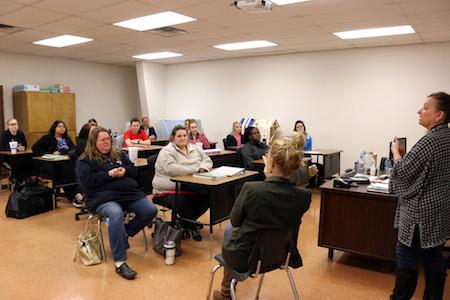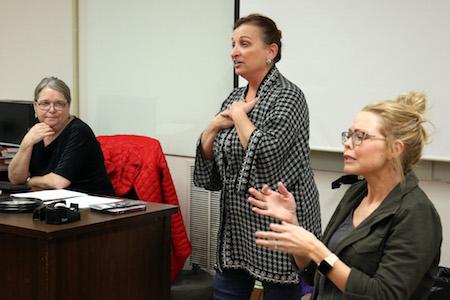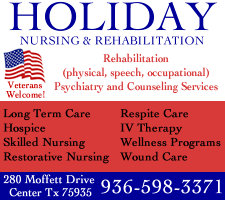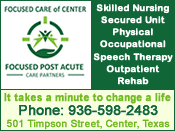
February 8, 2019 - Panola College Certified Nurse Aide (CNA) students are learning about the power of music to awaken memories in patients with dementia and Alzheimer’s Disease. Anne Robbins, director of student programs for Music and Memory, presented a program about this therapy to CNA students at the Shelby College Center on Tuesday, Jan. 29.
Certified Nurse Aides provide basic care for patients and residents of long-term care facilities. Robbins told the students that Music and Memory has become more prevalent as a therapeutic technique.
“In 2014, only 56 facilities across the United States were using Music and Memory. In 2019, we have more than 6,000,” she said.
The Texas Health and Human Services Department adopted Music and Memory in 2016 as a means to reduce the use of anti-psychotic drugs for patients with dementia and Alzheimer’s.
The presentation included a viewing of the documentary “Alive Inside,” which showcases the research and application of the Music and Memory approach with various individuals. According to the documentary, “Music is magic. It’s a backdoor into the mind for people with dementia. Musical memories are so strong and they activate more parts of the brain than any other.”
The documentary includes a segment about an elderly man with dementia. His response after having headphones placed that played music from his past was startling, said Betty Gruber, Panola College CNA instructor.
"I worked Long Term care for a number of years and I used every tool at my disposal to reach my residents,” Gruber said. “Music was by far the most effective tool, reaching them through all their barriers, including cognition, emotional, and behavioral barriers. Henry represents what music can do. He was in the nursing home for 10 years, mostly non-verbal. But after a personalized music list was developed for him he came back to life, opening his eyes, interacting with the staff, and with his daughter. Henry was happy again. I've seen the powerful influence music has on residents. This program will have a huge impact on the way we interact with our residents, giving us another means of interacting, and providing an alternative to anti-psychotic medications and even behavioral hospital admissions. Music is a win for everyone."
When someone posted on the social media site Reddit a short video clip of Henry’s response, the clip went viral. Thousands of people commented and shared stories about their loved ones, vowing to use personalized music to try to reach them. Media coverage of the explosion of interest in Music and Memory led to expanded understanding of its potential.
The documentary explained that over-medication limits choice and control in these patients, while music creates spontaneity and memory. Robbins said half of the residents of nursing homes get no visitors. Music and Memory’s goal is to provide personalized music as a means to evoke joy and ease their sense of isolation.

The Panola College CNA students will participate with Panola Nursing and Rehabilitation, Carthage Healthcare Center, Marshall Manor Nursing and Rehabilitation, Pine Grove Nursing Center and Green Acres of Center. All of these facilities are utilizing Music and Memory with their residents.
Beginning in summer 2019, Panola College Occupational Therapy Assistant students will receive volunteer certification through Music and Memory. Once trained, these OTA students will implement the program with seniors.
The OTA program is planning to use Music and Memory as part of an overall “Best Friends Project,” which will be part of the clinical rotation. Terrie King, OTA instructor and academic field work coordinator, said the “Best Friends Project” will pair OTA students with seniors living in assisted living and/or skilled nursing communities.
“We believe in ‘learning through doing’ and the best way to understand the aging process and the needs of seniors is to connect and support seniors. Our students will design and implement evidence-based therapeutic activities that have been proven to support senior wellness. Music and Memory is one of those evidence-based programs that makes a difference.”
Kelly Reed-Hirsch, Dean of Health Sciences, said she is excited to have Panola College students involved in Music and Memory. “This program will allow our students to expand their knowledge and abilities to work with individuals with dementia or other cognitive challenges. When I think about my grandmother who lived with Alzheimer’s for many years, when she heard ‘Boogie Woogie Bugle Boy’ and other music from that era, she lit up and was more like how she was before the horrible disease took her memories of us from her.”
For more information, contact Anne Stacy-Robbins, Texas Director of Student Programs, 646-856-0362, or email astacy@musicandmemory.org.









